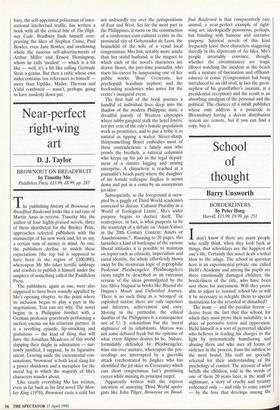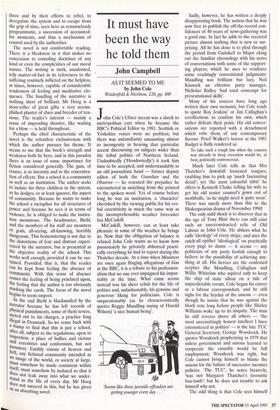School of thought
Barry Unsworth
BORDERLINERS by Peter Hoeg Harvill, £15.99, £9.99, pp. 251 Idon't know if there are many people who really think, when they look back at things, that schooldays are the happiest of one's life. Certainly this novel deals a lethal blow to the adage. The school in question here is an experimental private one called Biehl's Academy and among the pupils are three emotionally damaged children, the borderliners of the title, who have been sent there for assessment. Will they prove able to adjust to 'normal' school life or will it be necessary to relegate them to special institutions for the retarded or disturbed?
The irony — and the peculiar horror — derive from the fact that this school, for which they must prove their suitability, is a place of pervasive terror and oppression. Biehl himself is a sort of perverted idealist who believes in leading his charges to the light by systematically humiliating and abasing them and who uses all forms of violence in the process, from the subtlest to the most brutal. His staff are specially selected for their understanding of the psychology of control. The account of what befalls the children, told in the words of one of them 20 years later, is the stuff of nightmare, a story of cruelty and tyranny redeemed only — and only to some extent — by the love that develops among the three and by their efforts to rebel, to deregulate the system and to escape from the grip of time, seen here as remorselessly programmatic, a succession of accounted- for moments, and thus a mechanism of control used by the authorities.
The novel is not comfortable reading. There is a bleakness in it that makes no concession to consoling doctrines of any kind or even the complexities of our moral nature. The writing is stark, unadorned, icily matter-of-fact in its references to the suffering routinely inflicted on the helpless, at times, however, capable of considerable tenderness of feeling and meditative elo- quence. The handling of the narrative is nothing short of brilliant. Mr Hoeg is a story-teller of great gifts, a very accom- plished planter of clues and breeder of ten- sions. The reader's interest — mainly a sense of impending disaster, like waiting for a blow — is held throughout.
Perhaps the chief characteristic of the novel is the relentless exclusiveness with which the author pursues his theme. It seems to me that the book's strength and weakness both lie here, and in this paradox there is an issue of some importance for fiction considered generally. The gain, of course, is in intensity and in the concentra- tion of effects. But a school is a community as well as an institution. The author seeks to isolate his three children in the system, so he dodges, or at least ignores, the aspect of community. Because he wants to make the school a metaphor for all structures of Power and because he sees it in terms of violence, he is obliged to make the institu- tion monstrous. The headmaster, Biehl, and the members of his staff are monsters or gods, all-seeing, all-knowing, horribly dangerous. This bemonstering is not due to the distortions of fear and distrust experi- enced by the narrator, but is presented as the objective reality of the school. This works well enough, provided it can be sus- tained. Provided, that is, that the reader can be kept from feeling the absence of community. With this sense of absence comes the feeling of being practised upon, the feeling that the author is too obviously stacking the cards. The focus of the novel begins to seem suspect. In the end Biehl is blackmailed by the narrator because he has left records of Physical punishments, some of them severe, Meted out to his charges, a practice long illegal in Denmark. So we come back with a bump to find that this is just a school, after all, subject to the regulations, open to alsPection, a place of bullies and victims and eccentrics and conformists, but not monsters. Earthly visions of heaven and nen, any fictional community intended as stnh image of the world, or society at large, list somehow be made consistent within ,itselt must somehow be isolated so that it u_.oes not leak away into what we under- 'land as the life of every day. Mr Hoeg 'lees not succeed in this, but he has given os an absorbing novel.



























































 Previous page
Previous page